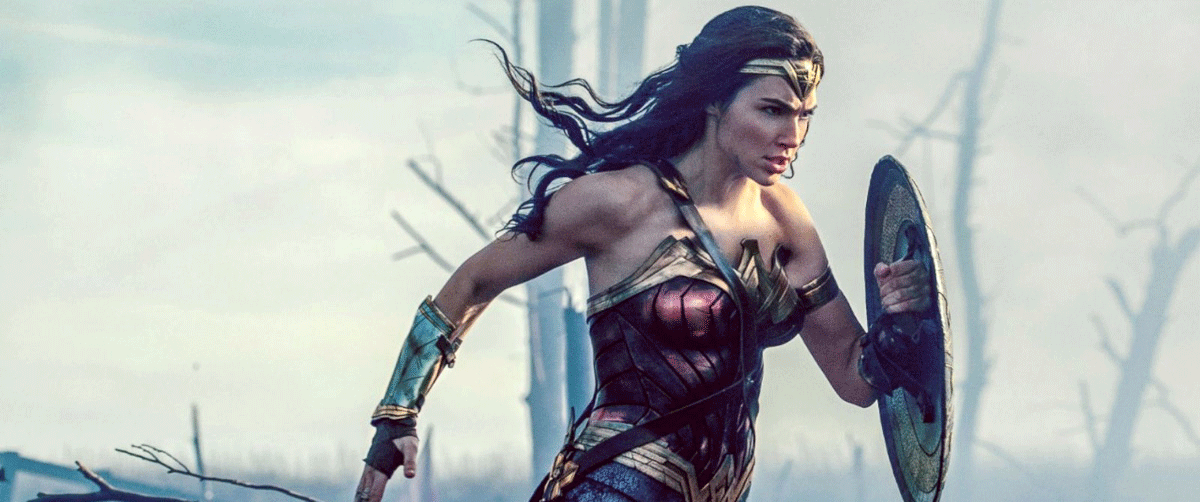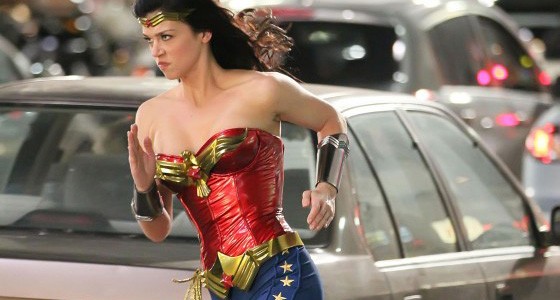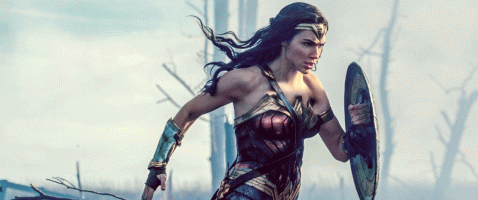Guest columnist Sarah Beach joins us for a look at the phenomenally successful Wonder Woman film….

The long-awaited Wonder Woman film arrived in theaters on June 4, 2017. It happily won the box office over the weekend and has continued to perform well since the opening. An additional note regarding the audience response that’s worth remarking on is that many of the women who see the film have said “I’ve waited all my life for this.”
Why should this be so remarkable? It isn’t because it is just another comic book movie. It is that the film and its making put women on center stage in many ways, and they have managed to prove they are quite capable of holding that position.
It has taken many, many years to get a Wonder Woman film made. The character herself burst on the comic book scene over 70 years ago, and aside from the television series in the 1970s, she’s only appeared in cartoon versions of the Justice League, until her scenes in Batman V. Superman last year. Studio attempts to get a film version (or a new television version) launched ran aground time after time. In part, this was often due to handling of the character that ended up being less than satisfactory. She is not an easy character to write. But just as often, the problems had to do with licensing rights and behind-the-scenes politicking of producers.

So what prompted this attempt? I suspect it was, in part, the success of Christpher Nolan’s reboot of the Batman franchise, followed by Marvel Studios films successfully capturing audiences. Since Wonder Woman is one of the primary heroes of the DC Comics Universe — indeed, with Superman and Batman, she makes up what is called The Trinity — many have wondered why she was not given center stage long ago in a cinematic work.
Part of the hindrance was Hollywood’s resistance to giving women the reins and the spotlight. After Halle Berry’s disastrous Catwoman failed, the then-head of Warner’s proclaimed that women couldn’t carry a film and Warner’s would never again greenlight a female-led film. The fact that Catwoman’s story was abysmal was not considered as a major factor in the failure. The Word From On High had been delivered and that was that. Additionally, there was a persistent attitude from money men, that women couldn’t handle directing action (this, in spite of the multi-Oscar winning The Hurt Locker from director Kathryn Bigelow in 2008). Indeed, the thinking ran that women didn’t like action flicks. Where this idea came from no one knows, given that women viewing Lethal Weapon multiple times certainly contributed to the success of a film released in what was supposed to be the dead time of the box office year, April. Many women do enjoy action films, if the story involved is one of character and heart.
So, then, what about this movie? Especially since the filmmakers took the unexpected step of setting the story in World War I. That initially seemed dubious, given that the character was created during the challenges of World War II and fighting Nazis. But I found it a wise choice, once I got into the film. The virtues of the character are such that introducing them into the “real world” in the present day and age would be laughable. Unfortunately, though we in the audience may long to see real people of sterling honor, we don’t expect it. There is the danger that if Wonder Woman were introduced to “man’s world” in the 21st century, she might seem laughable. And the whole object of the film is to make clear that Wonder Woman is not laughable. Setting the story in World War I makes Diana’s commitment to honor and truth much less corny. It fits in well there. And once she is established in “man’s world” it is easier to believe her to be continuing on as she began.

©Warner Bros. Entertainment/Ratpac Dune Entertainment. CR: Clay Enos.
Casting the characters was well handled in the film. Very few critics of any stripe are claiming that Gal Gadot does not carry off the tiara of Wonder Woman perfectly. She has the athleticism and intensity one expects of a trained warrior. The Amazons are well cast. Actual athletes were invited to play the parts of the women warriors, and they move with the precision of people who know what their physiques can do. Connie Neilson and Robin Wright deliver natural gravitas to the roles of Hippolyta and her sister Antiope. Chris Pine (of Star Trek, not Chris Pratt of Guardians of the Galaxy) is well cast as Steve Trevor. He’s one of those actors who brilliantly show a character’s inner thoughts on their face, letting you know what is going on without having to pontificate about it. David Thewlis takes on a character serving apparently ambiguous purposes in the film, a role that in earlier years might have been played by David Warner. But the gem in the casting is Lilly Aspell as the 8 year old Diana, the only child on the island of the Amazons. She perfectly captures the eagerness and joy of the young Diana, a character definition that is brought forward to the adult Diana.

In the film itself, the action sequences are great. They are shot in a clear narrative way, so that the audience never mistakes what is happening. Visually, Themyscira has the grace and beauty of a land inspired by classical Greek art and architecture. The seemingly pristine realm of the Amazons provides a sharp contrast to the darker, grimmer “man’s world” of the World War I era. For the grace notes, Diana takes the changed nature in stride, though she obviously finds the values that have created what she finds to be doubtful. She displays her bright, happy curiosity on hearing a baby’s cry and in her first taste of ice cream. These touches add to the sense of reality of the place — we are carried along by Diana’s reactions to what she finds.

The conflict for Diana in the film is her sense of purpose: if she kills Ares, whom she believes to be behind the horrific nature of the war that Steve Trevor describes, then the whole of the world will find its way to the type of peace the Amazons have enjoyed. Of course, those in “man’s world” find her fixation on Ares perplexing, for they cannot bring themselves to regard the Greek god as an effective force in the world. Even so, Steve is swayed by Diana’s certainty. Since he is, step by step, smitten, charmed, fascinated, and mesmerized by Diana, that is perhaps not too surprising.
Does the film have weak points? Perhaps yes, in that some explanations could have been fleshed out more fully. But to do so would sacrifice the pace of the film, which moves forward well.
For me, as a long-time reader of Wonder Woman, the most notable weakness is a factor from outside the story. And that is that the only effective Greek gods in the story are male: Zeus, though gone by the time of the story, has set things in motion, and Ares, the god of war who is stirring up the turmoil of World War I. Of the Greek goddesses, only Hestia is mentioned, as the maker of the Lasso of Truth. I grew up on the origin version where Diana was created from clay and endowed with life and virtues by the Greek goddesses, upon whom she frequently called — Hera, Aphrodite, Athena, Artemis. But they are nowhere in sight in the film, not even with a glancing mention.
The argument could be made about how “patriarchy” is trying still to “take over” and subvert the cultural impact of Wonder Woman. Instead of an origin that is “all women,” in the film, Diana’s existence is now by agency of Zeus (one way or another: either he brought the clay to life, or he had relations with Hippolyta).
However, I’ll give that matter a pass. The dismissal of female divinity (other than Diana herself) isn’t overt. And it is balanced out by the end message of the story: that love is more powerful than anything. The story keeps its power going forward, not just with the “love is stronger” theme, but also that it makes clear that there is a cost to living, a cost to standing against evil, a cost for any end of genuine value.
The point about the film that inspires the “I’ve waited all my life for this film” is that Diana is at no time defined by others. Yes, she was created to destroy Ares, and she does so. But Ares attempts to claim that her doing that makes her just like him, his true sibling. But she refuses that definition, remembering the power of sacrifice given in love. As a result, her choice to define herself ends up being the most powerful aspect of her.



I haven’t seen the film yet, though I am glad it is doing well and is treated seriously. Like Superman, WW is a character who is easy to do badly, and comically. They are virtuous, noble characters and modern entertainment seems to find this quaint and corny. So, they either co the full on comedic route (often mean-spirited and rarely funny) or the ultra-dark and grim route. That may work for Batman (though Batman TAS showed you could have a nice balance of dark and light) for these characters it doesn’t work. They represent the best qualities of humanity, metaphorically. I’m glad to see those involved realize that and acted upon it.
I do find the lack of references to the Greek goddesses sad, but predictable. Athena and Aphrodite are central to the WW mythos, as is Hera and Artemis. Athena is both wise and a fighter, in Greek myth, and is a great model for Wonder Woman. Artemis, or, as the Romans called her, Diana, is goddess of the hunt, among others, and sister to Apollo. It seems to me the Greek contingent should have centered around these goddesses, mentoring Diana to correct the mistakes of their male brethren. Of course, a male dominated Hollywood isn’t likely to go for that approach. It’s the same reason why Black Widow has such a fan base, yet no movie has been slated for her. Women can’t carry an action film? I guess the Alien franchise doesn’t count, or the original La Femme Nikita, or Michelle Yeoh’s Hong Kong action films. Women can’t direct action? Aside from Bigelow, there is a precedent from way back: Ida Lupino, who directed films and episodes of such action-adventure series as The Untouchables, the Rifleman, The Virginian, Daniel Boone; Have Gun Will, Travel; The Fugitive, Honey West (with a female action hero) and episodes of The Twilight Zone and Alfred Hitchcock Presents.
Still, kudos to those who made WW a success and we look forward to more. Now, maybe she can get the males in line and give us better films from the Y chromosome crowd.
I guess the Alien franchise doesn’t count, or the original La Femme Nikita, or Michelle Yeoh’s Hong Kong action films.
Terminator, A Nightmare On Elm Street, etc…
When I first saw The Wolverine, I was shocked at the twist:
Despite all expectations and precedent, it was actually good.
I’ll spare you the details of my descent away from DC films, but suffice to say, it was hard to get me to even go. After a while, I started hearing the right things from the right people, I went along, and guess what?
Spoilers: Wonder Woman had the same twist.
DC can make an enjoyable movie after all!